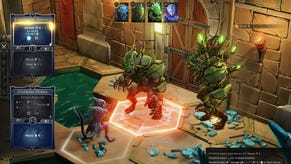Video Games: More than Just Fun for the Sisters of St. Mary of the Pines
Elderly Residents of Mississippi Retirement Center Join the 50 million+ Other "Senior" Consumers Who Find Therapeutic Benefits in "Casual" Video Games
CHATAWA, Mississippi - March 5, 2007 - Two years ago, 72-year-old Sister Marie Richard Eckerle, School Sisters of Notre Dame (SSND) bought a copy of Bookworm for a computer at St. Mary of the Pines, a community for retired SSND in Chatawa, Mississippi. She was a fan of the video game, and her enthusiasm soon spread among her community members. She recalls, "It quickly became popular with so many others that we knew we'd better get more copies!"
Now St. Mary of the Pines owns a dozen more copies of Bookworm and has expanded their collection to include other "casual" video games, such as Bejeweled and Chuzzle. The games have become a regular - and important - part of daily life at St. Mary of the Pines. Staff and residents use them not only for entertainment, but also as a means of encouraging socialization and mental stimulation.
The St. Mary of the Pines story is not so unusual. It mirrors the astonishingly broad movement of older consumers toward family-friendly, non-violent puzzle, word and action fare-so-called "casual" video games. According to the latest industry data, more than 50 million consumers age 50 and above now play these casual games on a regular basis. From the mental and even physical health benefits, to the sense of accomplishment and social interaction and bonding opportunities with both peers and children/grandchildren, older consumers have found a lot to like in casual games.
And this tremendous community of older gamers is growing as the medical and elder care communities adopt casual games into a greater variety of treatments.
Dr. Carl Arinoldo, a Stony Brook NY-based psychologist of 25 years and an author and expert on stress management, uses games such as Bookworm himself and recommends them to his patients. "I find that these types of games are wonderful as a stress management tool, while at the same time providing excellent cognitive exercise," he explains. "And studies have shown that these kinds of games also offer distraction for patients suffering from chronic pain-some patients cite actual pain relief - and provide mental stimulation that can stave off, or slow the progress of, Alzheimer's, dementia and other brain/memory disorders."
The community of sisters at St. Mary of the Pines is familiar with such games as Bookworm and Bejeweled. One community member, Sister Theresa Dietz, 76, SSND, whose ministry includes monitoring the computers in St. Mary of the Pines' Computer Cove, said she has noticed some of her companion sisters who normally don't rush to experience new activities, especially using the computer, interested in the games. "Once some of the sisters saw us playing Bookworm, they wanted to know what the game was all about," she recalls. "Some of those sisters included sisters who had previously shied away from the computers because they felt they could not manage the movements of the mouse well. They made a real effort in order to play the game, and in a week or two their control of their hands and fingers was noticeably improved. It was Bookworm that seemed to appeal enough to make them overcome their struggles with the mouse."
Another community member, Sister Jean Marie Smith, SSND, age 60, says Bookworm in particular has helped her cope with her Attention Deficit Hyperactivity Disorder (ADHD), a cognitive disability found most commonly in adults. "I play the games for about an hour each day to keep my attention focused and my mind stimulated in a controlled, structured way," she says.
Dr. Arinoldo surmised that older players' motives for playing were influenced by a growing awareness of the importance of "mental calisthenics" for maintaining a healthy mind. "Older players don't cite 'entertainment' as the primary reason for playing. It seems reasonable to assume that older players of these games are likely to recognize the benefits of cognitive exercise more readily than younger consumers," he said. "When you're 65 or 70 and you play a game of Talismania or Chuzzle, you're more likely to identify improvements in your mental acuity that might go unnoticed by younger people."
Sister Theresa marvels at the motivational effects and increased social interaction the games have inspired. "We have residents suffering from Alzheimer's and other infirmities who now have more ways - and more incentive - to socialize with other residents by playing the games together," she states. "We have one sister in particular who enjoys playing Bookworm and Bejeweled every chance she gets. She finds the games relaxing and a different kind of mental stimulus. All in all, the games have been great for many of us, for many different reasons."
PopCap Games® ( www.popcap.com), the leading developer and publisher of casual games, recently conducted a survey involving more than 2,000 casual game players, and found that:
· 47% of all casual game players are 50 or older, and nearly 20% are 60 or older
· Of players 50 or older, 74% cited cognitive exercise (mental workouts), 86% noted stress relief, and 62% chose memory strengthening as benefits they experience from playing casual games
· Fully 32% of respondents 50 or older said the games distract them from chronic pain/fatigue, and nearly one in ten said they derive actual relief from chronic pain/fatigue when playing
· "Seniors" play casual games for longer periods of time, and more frequently, than younger players. 65% of players age 50 and up say they play the games on a daily basis, compared to less than half of younger players.
· As the single most important reason for playing, subjects age 50 and up chose "stress relief/relaxation" (39%) and "mental workout" (21%)
· 86% of older survey respondents said that they felt playing casual games offered them physical and/or mental health benefits, compared to 74% of under-50 respondents
· Only 18% of subjects 50 or older selected action games as one of their genre preferences, compared to 50% of respondents under the age of 50
· Older players chose puzzle (84%), word (66%), and card (57%) games as their top three genres of video games
About the School Sisters of Notre Dame of Dallas
Established in 1961, the Dallas Province of the School Sisters of Notre Dame is one of six North American provinces of an international congregation of women religious who live in community and serve the mission of Jesus through educational ministry. Currently, Sisters of the Province serve in traditional educational settings, social service, health care facilities, and pastoral work. St. Mary of the Pines is the site of the Province's largest local community of elder sisters and a retreat center that serves not only sisters, but people of faith from the broader community.
About PopCap®
PopCap Games ( www.popcap.com) is the leading multi-platform provider of "casual games" - easy-to-play yet utterly entertaining and engaging brain food enjoyed by players young and old, male and female. PopCap's games have been downloaded more than 200 million times by consumers world-wide, and its flagship title Bejeweled® has sold more than 10 million units across all platforms. PopCap games are available for Web, PC, Mac, mobile phones, PalmOS and Windows Mobile PDAs, Xbox Live Arcade, iPods, in-flight on leading airlines, as scratch-off lottery tickets, and more.
PR Contact:
Garth Chouteau
garth@popcap.com
415-602-8147








